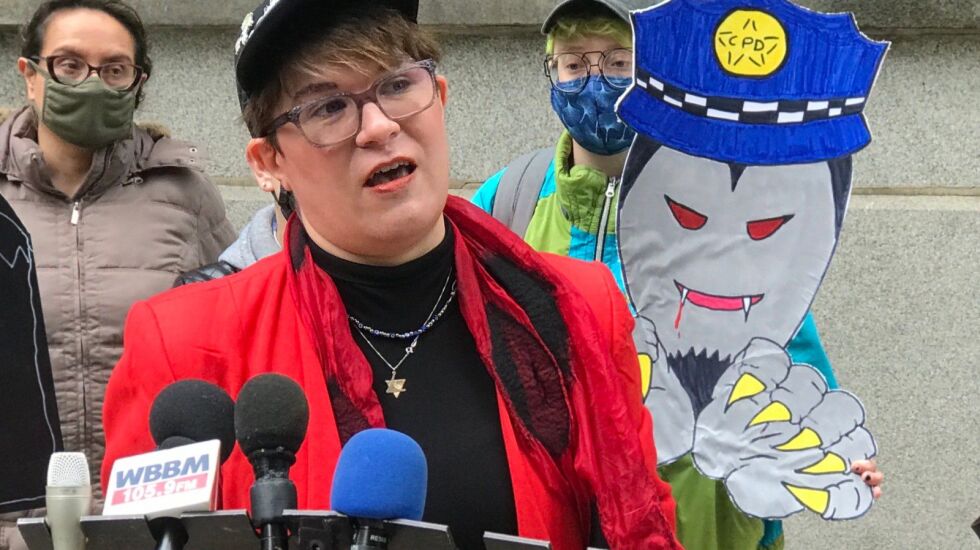
The nation’s new 988 “lifeline” is not only easier to remember than the 11-digit suicide-prevention line it’s replacing, it’s also supposed to be a more supportive and trustworthy alternative to calling 911 and risking a police response — a traumatic visit that could lead to involuntary treatment, incarceration, even death.
But the nonprofit agency that runs the only 988 call center in Chicago said fears among social workers about police ties to the lifeline are spreading — and unfounded. The agency, Community Counseling Centers of Chicago, says those fears could discourage people from calling 988 and deprive them of needed care.
“When there is messaging that 988 is just going to result in police involvement and it’s no different than 911, that entrenches the belief that people don’t have an option in terms of getting help,” said Patrick Dombrowski, chief clinical officer of the agency, known as C4. “I think it damages the efficiency and effectiveness of the aims of 988.”
Since 988’s rollout in July, according to Dombrowski, C4 has received about 350 calls to the three-digit number and has not transferred any to Chicago’s Office of Emergency Management and Communications, the entity that receives 911 calls and dispatches police and fire personnel.
C4 resolved 95% of the calls on the phone, aiming to provide all callers “a warm and supportive response that takes the time to really understand their needs,” Dombrowski said.
For the other 5% of calls, he said, C4 dispatched mobile crisis teams run by the agency and nonprofit providers including Thresholds and Trilogy.
Dombrowski said he hopes numbers like those will help allay concerns about 988 raised by mental health professionals like Elena Gormley of Social Service Workers United–Chicago, an organization whose Facebook group has nearly 900 members.
“If you call [988], and the person on the other end assesses that you’re an immediate danger to yourself and others — and those standards are not always clear — law enforcement will be called,” said Gormley, who earned a master’s in social work at the University of Illinois-Chicago last year.
A live one-hour webinar, held for mental health care professionals three times this month, is urging them to take a “988 WAIT!” approach.
“We want you to think about this through a racial equity lens,” webinar facilitator Brit Holmberg told 78 people logged on to Zoom for a session last Thursday. “We don’t want to encourage people to use 988, especially if they have past trauma or they have had negative experiences with the police. That could be really detrimental to their mental health.”
Holmberg asked the attendees to keep victims of police violence in mind as he screened photos of six people killed by Chicago officers during mental health crises.
Concerns about 988 are widespread among social workers, according to Latesha Newson, president-elect of the 5,000-member Illinois chapter of the National Association of Social Workers.
Newson said they’re worried that “the same cycle of injustice and abuse that has been taking place at the hands of police toward individuals with mental health challenges is going to continue.”
But C4’s Dombrowski said his agency will transfer a 988 call to the city’s Office of Emergency Management and Communications, which runs 911 in Chicago, only when “there is an imminent risk that a mobile crisis team can’t respond in a timely manner or the caller indicates that they do need transportation to the emergency room for care.”
“In extreme situations, such as immediate threat to harm self or others, we may engage with OEMC, but it is extremely rare and would involve consultation with a supervisor of the 988 program,” he said.
C4, contracted by the Illinois Department of Human Services, handles 988 calls from 19 ZIP codes on Chicago’s West and North sides. Calls from other parts of the city — including the South Side — are answered by a call center in downstate Bloomington, a setup that raises equity and safety concerns.
Still, Dombrowski said 988 can help fill a gaping hole in U.S. health care.
“For individuals on Medicaid, there are not nearly enough mental health services,” he said, referring to federally funded insurance for low-income people. “They can often be waiting months before they can get a therapist. Sometimes a 988 call is the only service available.”
To make mental health care accessible to all and avoid police responses to crises, Dombrowski said, 988 is a step in the right direction.
Chip Mitchell reports on policing, public safety and public health. Follow him at@ChipMitchell1. Contact him at cmitchell@wbez.org.







